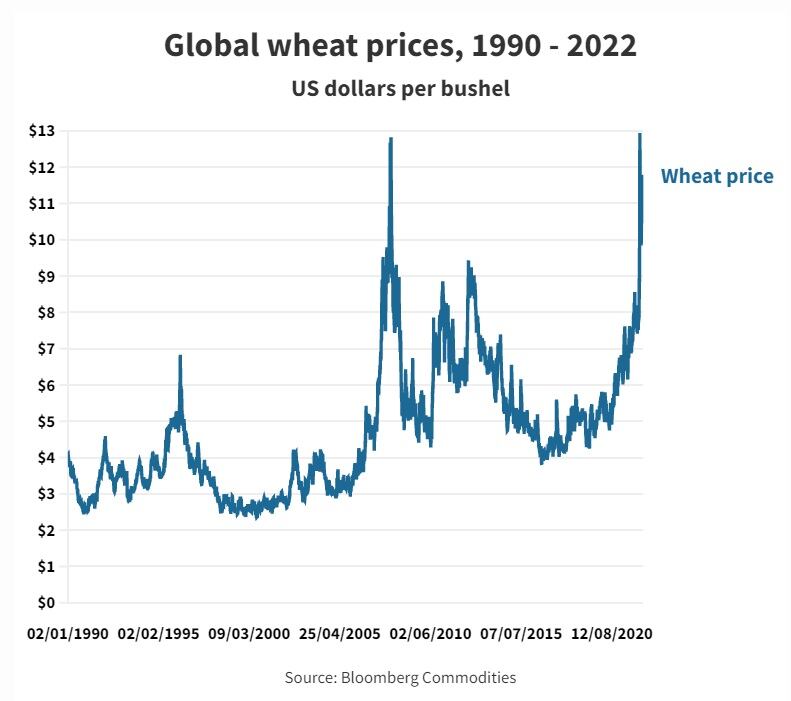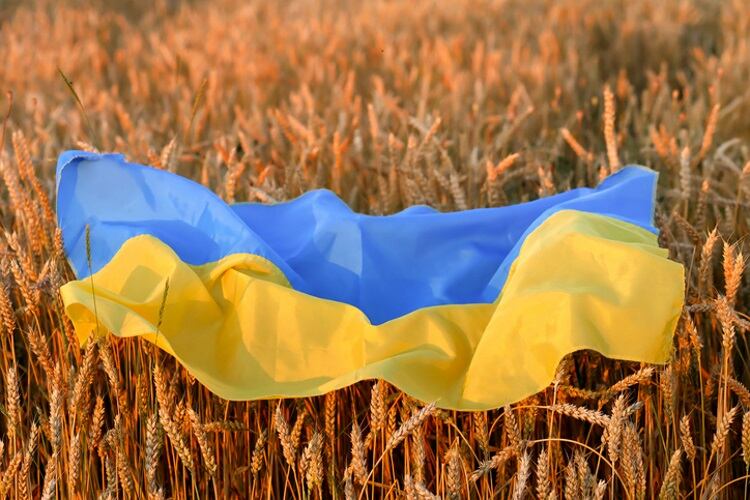- Russia is blockading Ukraine’s Black Sea ports, barricading the flow of food around the world.
- The aggressor has also been accused of stealing $100m worth of Ukrainian grain.
- But deputy chair of Russia’s security council Dmitry Medvedev said Russia would continue to hold the vital supplies hostage unless the West puts an end to its sanctions on the Kremlin.
Wheat prices have shot up more than 60% this year, driven by disruptions from Russia’s invasion of Ukraine. Together, Russia and Ukraine together account for nearly a third of global wheat supplies. Ukraine is also a major exporter of corn and barley and 69% of the world’s sunflower oil.

“The Russian government seems to think that using food as a weapon will help accomplish what its invasion has not – to break the spirit of the Ukrainian people,” said US secretary of state Anthony Blinken at a meeting called to address the growing crisis.
“The food supply for millions of Ukrainians and millions more around the world has quite literally been held hostage by the Russian military.”
Hurricane of global hunger
The Ukrainian Foreign Ministry said the criminal acts contravene the fundamental principles of the UN’s Food and Agriculture Organization (FAO) – achieving food security for all and overcoming hunger.
Millions are facing global famine because of Putin’s Black Sea blockade, which is preventing Ukrainian agricultural exports from reaching international markets. Ukraine is one of the world’s largest grain exporters and an emerging agricultural superpower that feeds more than 400 million people.
In late March, the FAO warned the war risked unleashing a “hurricane of global hunger”, while the World Food Programme estimated that 44 million people around the world are “marching towards starvation.”
Ertharin Cousin, founder and CEO of Food Systems for the Future, added: “While this crisis will impact all of us around the world in significant ways, low-income economies risk devastation and potential unrest.
“We’re not just talking about the poorest of the poor, who are already suffering from hunger. We’re also talking about people who could recently afford a loaf of bread for their families and who now will be unable to do so.”
UN Secretary-General Antonio Guterres has appealed to Putin to allow the safe export of grain stored in Ukrainian ports.
“It threatens to tip tens of millions of people over the edge into food insecurity, followed by malnutrition, mass hunger and famine, in a crisis that could last for years,” he said.
The number of people facing severe food insecurity had doubled from 135 million before the coronavirus pandemic to 276 million today. The number of people living in famine conditions has increased by more than 500% since 2016 and now sits at more than 500,000.
“The complex security, economic and financial implications require goodwill on all sides for a package deal to be reached,” said Guterres.
‘We are not idiots’
However, Medvedev, who served as president of Russia between 2008 and 2012, said there is ‘no logic’ in the call.
“On the one hand, insane sanctions are being imposed against us, on the other hand, they are demanding food supplies. Things don’t work like that, we’re not idiots.”
Apart from blockade, Russian forces have also been accused of stealing grain from occupied areas. According to the Ukrainian Agriculture Ministry, the occupiers have seized 400,000-500,000 tonnes of grain worth more than $100m.
According to Serhii Dvornyk, a member of Ukraine’s mission to the UN, Ukraine’s grain exports fell from 5m tons a month before Russia’s February invasion to 200,000 tons in March and about 1.1m tons in April.
Agriculture minister Mykola Solskyi said six regions in Ukraine had completed their early spring grain sowing despite the Russian invasion. He gave no 2022 grain harvest forecast, while analysts see output at 41.4 million tonnes this year compared with 86 million tonnes in 2021.
The Kremlin, of course, has denied the allegations.
On its website, the Ukrainian Foreign Ministry said Russian occupiers are consuming Ukrainian grain themselves, but are also attempting to sell it on international markets. It has warned consumer countries that the purchase of this grain could come with implications.
“Any country that knowingly purchases stolen grain is considered to be complicit in the crime,” the Ministry said.
UK government’s U-turn sends mixed message
Meanwhile, in light of the ‘unprecedented’ financial pressures facing hard-up Brits, the UK government has announced a deferment of its laws regulating the promotion and advertising of foods deemed high in fat, salt and sugar (HFSS).
The regulations – set to come into force in October 2022 – have been delayed for a year, as Brits are buckling under the pressure of runaway inflation, some even foregoing heat to eat.
However, celebrity chef Jamie Oliver has accused PM Boris Johnson of playing politics with children’s health.
In a letter to the PM, Oliver said 1 in 4 primary school children are obese and this has worsened over the pandemic. He also said people who live in lower income areas are twice as likely to be obese.
He has called on the public to protest the “reckless U-turn” by holding an 'Eton Mess' protest outside Downing Street. The much-loved dessert was invented at Eton College, which the PM attended. Oliver said the protest symbolises “the privilege and the mess that is our British government and its inability to do the right thing”.

Mark Dodds, chair of the Chartered Institute of Marketing’s Food, Drink and Agriculture Group, concurred with Oliver that the government’s about-face sends mixed messages.
“The Government's decision to delay regulations on HFSS product offers and advertising sends mixed messages to both consumers and businesses,” he told BakeryandSnacks.
“Food manufacturers recognise the public’s appetite for healthier, tastier and more nutritious products. There will always be a place for authentic indulgences, think artisan cheese, and guilty pleasures, like biscuits, but the clear trend is toward transparency of ingredients and nutrition and British firms have invested millions in getting their marketing and product ranges ready for October.
“The temporary pause on promotions will reward those firms which have prepared least, and risk domestic producers losing out to imports of overseas marketing campaigns and products. Forcing product managers and retailers to now reset their pricing and promotional strategies for the next year will only cause further frustrations - not to mention the millions wasted in planning time.
“We urge the Government to truly consider the impact of this decision that is not only damaging to individual brands, but also to a population striving for improvement.”


